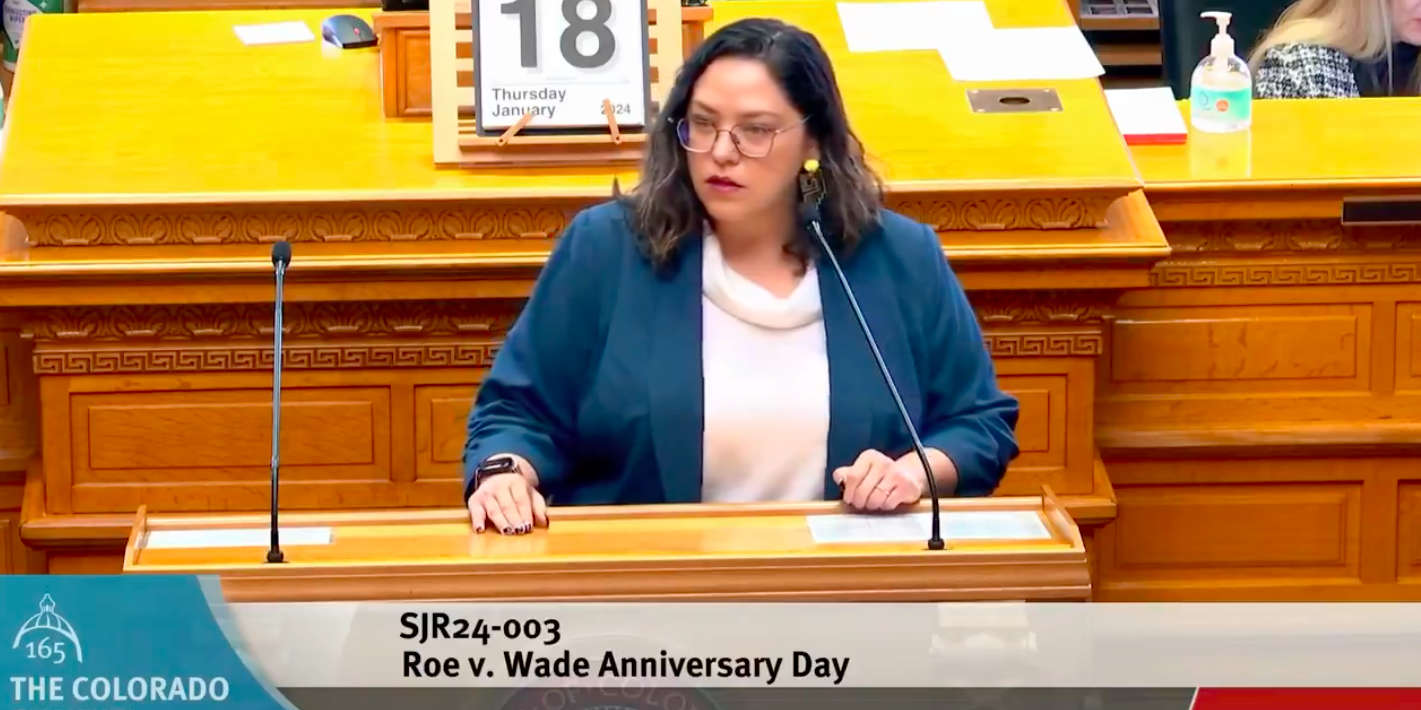Colorado’s Democratic legislators have introduced a resolution urging voters to support a ballot initiative to recognize the right to an abortion under the Colorado Constitution and to designate Jan. 22 as Roe v. Wade Day.
“After the Supreme Court overturned Roe v. Wade, a wave of anti-abortion legislation spread across the country, ripping away millions of Americans’ ability to access abortion care and putting the health and safety of thousands of our neighbors in jeopardy,” Sen. Julie Gonzales (D-Denver), one of the resolution’s sponsors, said in a news release. “We’ve fought back by solidifying Colorado as a safe haven for abortion and reproductive health care – but we must go further to ensure that the right to an abortion is secure. Enshrining abortion rights in our state’s Constitution will guarantee that every Coloradan can make their own choices and access the care they need.”
Since the Supreme Court’s Dobbs decision, which overturned Roe v. Wade, demand for services from the Colorado abortion providers and advocacy groups has increased exponentially. Abortion bans in states like Texas and Oklahoma have exacerbated what was already a staffing crisis for abortion providers, and are impacting routine obstetric and gynecological care.
“Everyone in health care is having trouble with staffing right now, but the abortion crisis, and it is in every sense of the word a crisis, is compounding that,” said Dr. Kristina Tocce of Planned Parenthood of the Rocky Mountains during a roundtable discussion with U.S. Sen. John Hickenlooper (D-CO) in 2022. “I think anyone who works in a health care facility now, around this room, will just emphasize that with this massive influx of volumes, even at baseline, before this decision in June, we were struggling to keep nurses on staff, and all other members of the health care team.”
In 2022, Colorado Democrats passed the Reproductive Health Equity Act, which enshrined the right to abortion care in Colorado law. In 2023, Democrats passed the Safe Access to Protected Health Care Package, which protects the rights of patients, providers, and future health care professionals and those assisting patients, prohibits deceptive trade practices for anti-abortion pregnancy centers, and makes health care more affordable and accessible by closing gaps in insurance coverage.
“We’ve made tremendous progress in Colorado to protect reproductive rights, but there is more we can do to make sure that Coloradans can continue to access the life-saving care they depend on,” said Sen. Faith Winter (D-Denver). “The right to an abortion has been challenged in Colorado 49 times since 2010, and that number is sure to continue rising. We must act now to safeguard the right to abortion in Colorado and ensure that all Coloradans have the power to control their body and their future.”

The “Right to Abortion” initiative will require 124,238 valid signatures to appear on the ballot, and because the “Right to Abortion” initiatives are repealing a provision of the state constitution, they will need signatures of at least 2% of registered voters in each of the state’s 35 state Senate districts and require a 55% majority for passage.
Abortion opponents are also collecting signatures for an initiative, the “Protections for a Living Child” ballot initiative, which would classify abortion as murder and result in the prosecution of patients and medical providers and the closure of any medical facility that aids in an abortion, including pharmacies that provide medication abortion.
Colorado voters have a track record of rejecting anti-abortion ballot measures. In 2008 Colorado saw the nation’s first attempt at a “fetal personhood” ballot initiative with Amendment 48. Former Colorado Republican Party Chair Kristi Burton Brown was the sponsor behind that measure, and has built her political career on her anti-abortion stance. Amendment 48, and a 2010 attempt, Amendment 62, were both rejected by voters with over 70% of voters opposed, and did not receive a majority vote in any county in Colorado. Amendment 67, in 2014, was rejected by nearly 65% of voters, and 2020’s Proposition 115, which would have banned abortions after 22 weeks of pregnancy, was defeated with 59% of the vote, after opponents spent $9.5 million to campaign against the measure. In 2022, an attempt to classify abortion as “murder” failed to gather enough signatures to even make it on the ballot.
In addition to the string of failed personhood amendments, Colorado Republicans have consistently introduced doomed legislation to restrict abortion access in Colorado. In February, 2022, Democrats rejected three anti-abortion measures, and this year, bills to end abortion in Colorado, provide pain medication to fetuses during abortions, and provide information about abortion pill reversal were voted down.




